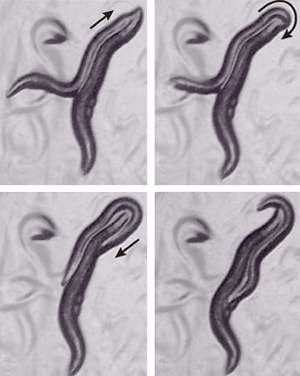Neurotransmitters linked to mating behavior are shared by mammals and worms

When it comes to sex, animals of all shapes and sizes tend behave in predictable ways. There may be a chemical reason for that. New research from Rockefeller University has shown that chemicals in the brain—neuropeptides known as vasopressin and oxytocin—play a role in coordinating mating and reproductive behavior in animals ranging from humans to fish to invertebrates.
"Our research shows that molecules similar to vasopressin and oxytocin have an ancient and evolutionarily conserved role in controlling a critical social behavior, mating," says Cori Bargmann, Torsten N. Wiesel Professor and head of the Lulu and Anthony Wang Laboratory of Neural Circuits and Behavior. "This work suggests that these molecules encode the same kind of information in the brains of very different animals."
Bargmann, whose laboratory studies the relationship between genes, neural circuits and behavior in the C. elegans roundworm, says vasopressin and oxytocin have been implicated in a variety of reproductive and social behaviors in humans and other mammals, including pair bonding, maternal bonding and aggressive and affiliative behaviors. Mice that lack oxytocin may develop social amnesia, and humans who sniff oxytocin through an inhaler change their cooperative behavior in computer games, behaving as though they "trust" other players more.
Bargmann's team, led by postdoc Jennifer Garrison, identified a peptide and two receptors in C. elegans worms that were similar to the mammalian oxytocin/vasopressin signaling system. Male worms that were engineered to lack this peptide, dubbed nematocin, were clumsy sexual partners.
"Although they could perform the motor aspects of mating, their sequences were inefficient, disorganized and repetitious," says Garrison. "Only a fraction of males lacking the peptide were able to complete mating by transferring sperm within five minutes of first contacting a partner, a time in which normal worms are usually successful."
Males lacking nemotocin or its receptors also spent less time looking for mates, as though they were less motivated to find partners.
More information: Garrison, J. et al., Oxytocin/Vasopressin-related pepotides have an ancient role in reproductive behavior. Science online: October 26, 2012.
Journal information: Science
Provided by Rockefeller University
















